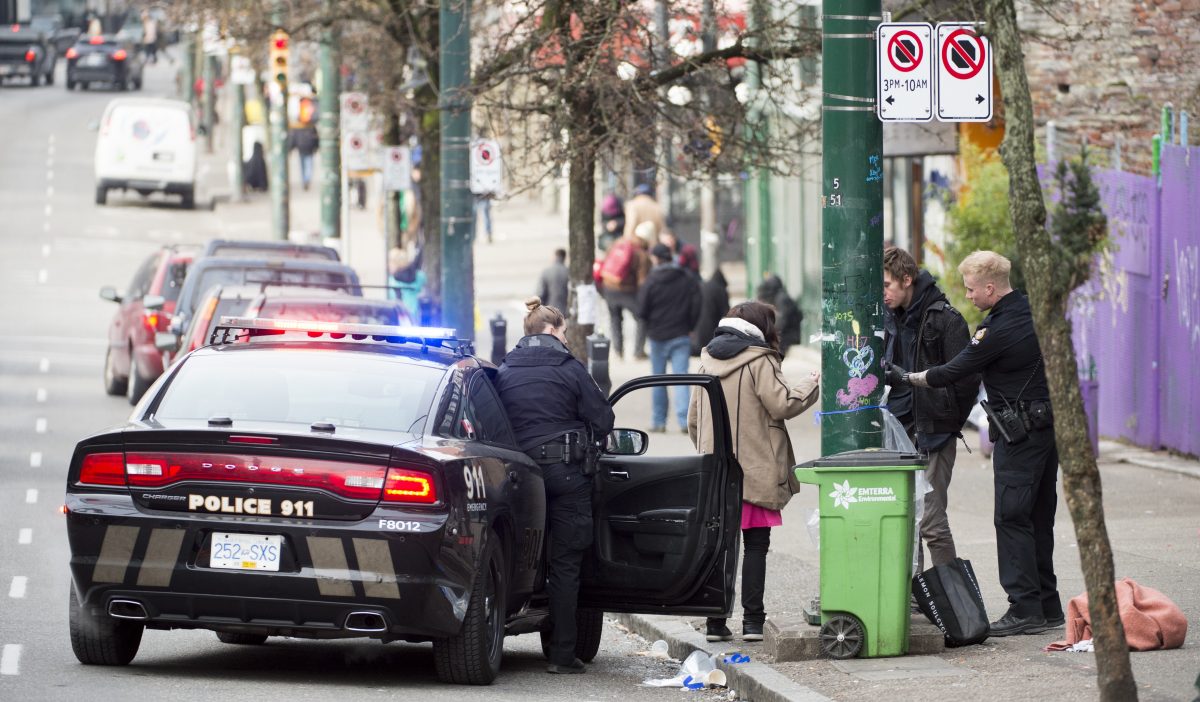Vancouver police say they don’t plan to change the way officers patrol the Downtown Eastside (DTES) despite a new study suggesting the force’s policing practices are negatively impacting overdose risk in the community.

The study, released Wednesday by researchers from the B.C. Centre on Substance Use (BCCSU) and the University of British Columbia, says policing practices in the DTES may actually be increasing overdose risks.
BCCSU research scientist Ryan McNeil said the root problem is that drug users feel intimidated and harassed by police.
WATCH (July 26, 2019): Metro Vancouver’s top doctor calls for safe drug supply

“People don’t trust police because they’re routinely stopped, they’re routinely searched, they often have warrant checks done,” he said.
McNeil and other researchers held interviews with 72 people who use drugs and spent 200 hours in and around overdose prevention sites in the DTES.
Many of those drug users reported negative interactions with police, who they say often park their patrol cars outside overdose prevention sites.
Those interactions included regular stops and searches along with drug users being harassed while using outside, according to the study.
McNeil said those policing methods are intimidating people looking for a safe space to use.
“It may mean people ducking into an alleyway, injecting in unsafe conditions, which are incredibly unhygienic and can … increase the risk of injection-related infections,” he said.
WATCH (Sept. 19, 2018): VPD responds to criticism about DTES drug seizure

McNeil added that many people told him they even fear calling 911 if someone is overdosing in front of them, worried that it could lead to them being arrested.
The study also found people feel forced to use alone to avoid police or “rush inject” drugs to avoid possession charges.
The B.C. Coroners Service has repeatedly pointed to using alone as a key factor in the ongoing overdose crisis across the province and in Vancouver in particular.
The latest numbers from the service found overdoses dropped throughout this past June compared to the year before. It also noted 538 people have died of suspected overdoses in the first half of this year, amounting to roughly three people a day.
The BCCSU study said annual drug charges laid by Vancouver police have dropped from 5,183 in 2005 to 1,629 in 2017, according to the latest police data.
But the study still calls on police to reduce car and foot patrols in the DTES in order to reduce feelings of intimidation and to avoid policing around overdose prevention sites entirely.
WATCH: (March 3, 2017) Trudeau conducts police ride-along through Vancouver’s DTES

Those recommendations are unlikely to become a reality, Vancouver police spokesperson Sgt. Aaron Roed said.
“It is unrealistic to believe that police will have to stay clear of all the blocks with overdose prevention sites,” he said. “We are seeing a high level of customer service in these areas.”
Roed added police were not consulted on the report but were happy to work with their partners in the area to improve their response and relationship to the community.
The BCCSU also voiced support for B.C. chief medical officer Dr. Bonnie Henry’s report from earlier this year that calls for the decriminalization of hard drugs.
Metro Vancouver’s chief medical officer and the Nurses and Nurse Practitioners of B.C. have made similar recommendations.
The provincial and federal governments have said they don’t support that move, while Vancouver city council has thrown its support behind creating a safe drug supply.
- Unique simulator helping B.C. aerial firefighting crews prepare for tough summer
- White Rock fatal stabbing suspect and victim may have been in physical altercation: IHIT
- High-profile B.C. sex offender Randall Hopley pleads guilty to 3 charges
- B.C. to ban drug use in all public places in major overhaul of decriminalization





Comments